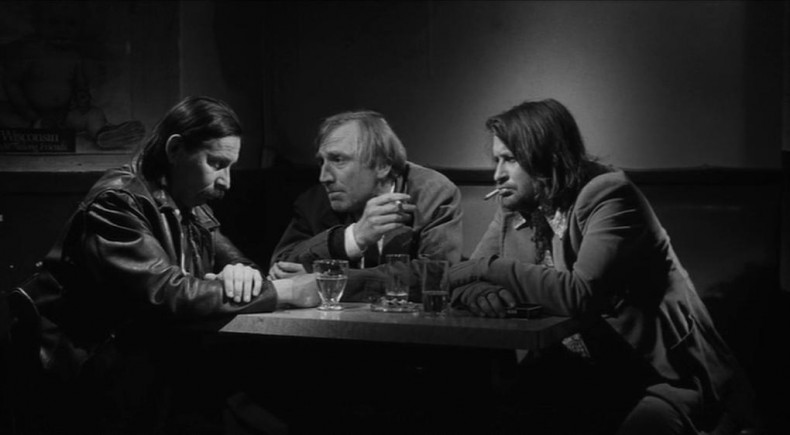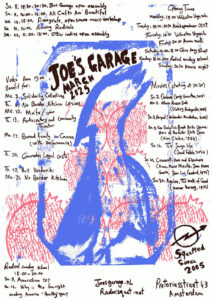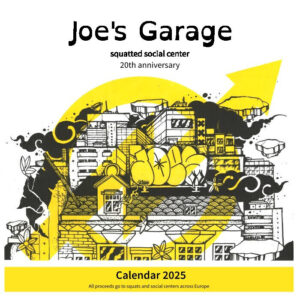Sunday April 24th 2016, Black and White movie night: La Vie de Bohème (Aki Kaurismäki, 1992). In French with English subtitles. Door opens at 8pm, film begins at 9pm. Free admission.
 La Vie de Bohème manages to mine more impact from the simple fact of movement than most movies can get even with a flurry of mobile shots and onscreen action. The title of the original novel translates to “Scenes from the Bohemian Life”, a title which could just as easily apply to a painting or set of paintings as it does to a film or collection of writings. Kaurismäki’s deep-focus shots are filled with the attention to detail and design that defines many of the greatest directors of onscreen comedy: Jerry Lewis, Frank Tashlin, and Kaurismäki’s contemporary Roy Andersson among them.
La Vie de Bohème manages to mine more impact from the simple fact of movement than most movies can get even with a flurry of mobile shots and onscreen action. The title of the original novel translates to “Scenes from the Bohemian Life”, a title which could just as easily apply to a painting or set of paintings as it does to a film or collection of writings. Kaurismäki’s deep-focus shots are filled with the attention to detail and design that defines many of the greatest directors of onscreen comedy: Jerry Lewis, Frank Tashlin, and Kaurismäki’s contemporary Roy Andersson among them.
Unlike their color scenery and elaborate contraptions, however, (Andersson in particular is capable of a how’d-he-do-that craft in the tradition of stage magic) Kaurismäki’s compositions create the impression of a series of still lives in which his characters move tentatively about. The first shot captures the poet Marcel Marx (Andre Wilms) rummaging about in a heap of trash before he commits a violent pratfall, picking himself up with a bemused demeanor as he mutters about the predicament. What did he think would happen?
The pause between stillness and the decision to make a move creates the nexus for La Vie de Bohème’s particular sensibility, a deadpan comedic style which also creates room for pure, unfettered sentimentality, as in a wordless scene depicting the characters at a summertime picnic, set to a reverie of strings.
Most often, however, the characters stand or sit rigidly within the frame, haggling with little resistance over a higher asking price for an original painting or travel expenses for a new job. The laughs come in the moments of silence, as when Jean-Pierre Leaud’s snobbish collector asks that one of the bohemians bring him his jacket, and a few seconds pass with no movement in either direction before Marcel arrives from offscreen, saying he’d taken it to the cleaners.
What an odd and beautiful sort of film this is. Even while it has consistency in its approach to comedy—the intersection of melancholy silence and laughter, the disruption of the composed image as the focal point of a scene—it resists any pattern or interpretation. What begins as simply “scenes” and episodes in the lives of loosely related characters coalesces into a sort of tiny collective, Marcel’s poetry leading him to take a job as the editor of a magazine for which he commissions the services of painter Rodolfo (Matti Pelonpää), a chance acquaintance, and the musician Schaunard (Kari Väänänen), who takes up a space in Marcel’s life by renting his old room. The scene in which Marcel’s put-upon landlord discovers that he has evicted one unreliable tenant for a man whose most important possession is a large piano provokes, one of the film’s bigger laughs.
But Kaurismäki’s picture is not so predictable as to settle into a groove in which the landlord might appear again, continually frustrated by his tenants. Though the trio come to enjoy one another’s company, they never settle into anything like a recognizable rhythm. In hindsight the opening vignettes of bohemian life prove rather necessary to establish context for the rest of the film, a story only superficially quiet and uneventful, in which the characters’ lives are changing in big and profound ways in every single scene.
Some of these changes provide comedic fodder. The scene in which Marcel meets with a publisher played by the American director Sam Fuller contains a close-up of Wilms’s face as the publisher silently counts out a large sum of money. You can see the priorities of his humble existence and perhaps some personal values changing in that very moment.
The most momentous change experienced by any of the characters is Rodolfo’s on-again, off-again romance with a young woman named Mimi (Evelyne Didi). Their scenes together, captured in Kaurismäki’s trademark slow-paced long shots, provide an answer to the lingering question of an earlier vignette. That scene sees Schaunard swooping in to seduce a woman eyed by Rodolfo in a bar, fading out on Rodolfo’s bemused expression.
On Pelonpää’s expressive, mustachioed face reflects the film’s conflict: how does one live a life free of material stability when renouncing a desire for lasting love and affection seems altogether impossible? Mimi hints at the difficulties their circumstances imposes on their relationship in a late scene, as she murmurs: “I love you, you know. But life is very hard.” The story bears her out, ending not on another dry joke or even with an outwardly hopeful scene; instead, Rodolfo takes the dog for a walk after a scene of profound and silent devastation leaves him unwilling to spend the evening with his fellow bohemians.
Kaurismäki separates his silences from dry comedy at the crucial moments: some things are just not funny. His film is full of paradoxes and tensions that define not just the bohemian life but the life of anyone who has wanted more love or money than they had. He illustrates his conflicts with a double-headed trout, with piles of trash and with a dog who waits to welcome his owner back into the country. His subjects may be poor, but in human understanding and in love his film runneth over.
Film night at Joe’s Garage, cozy cinema! Doors open at 8pm, film begins at 9pm, free entrance. You want to play a movie, let us know: joe [at] squat [dot] net


 ANYTHING GOES! Music,…
ANYTHING GOES! Music,…
